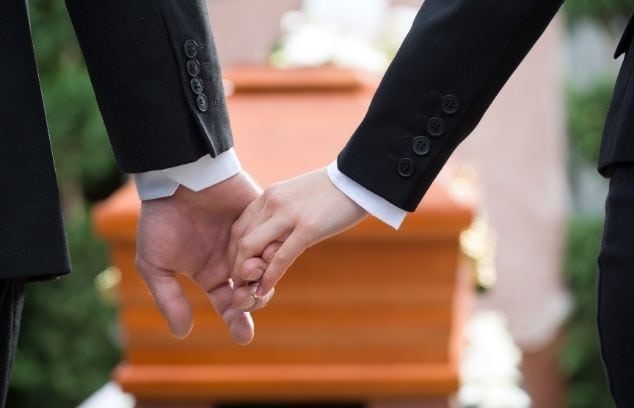The First Steps To Take After a Loved One Passes

Tips for Designing a Funeral Program
October 29, 2020
What Prayer Cards Are Used For
November 13, 2020Losing a loved one is a harrowing experience. In addition to grieving, you must tie up any loose ends left behind in their life. This balance of processing emotions and taking care of business gets overwhelming and often put off, but it is important that they get tended to. Honor You is here to help you manage the processes that follow a loss by laying out a checklist of the first steps to take after a loved one passes. When possible, delegate settling the deceased’s affairs to close family or friends, so you have multiple channels of support with all the complex tasks that proceed their passing.
Immediately
Get a legal pronouncement of death
A legal pronouncement of death is one of the first steps to acquiring a death certificate, which is a necessity in handling future loose ends. It is required by many companies as a form of proof of loss, including funeral homes. There are different approaches to receiving a legal pronouncement of death, dependent upon the scenario at that time of death. The following are varying situations that people experiencing loss are commonly found in…
- If you happen to be in a hospital at the time of your loved one’s passing, staff will be able to sort this out. Being in proximity to a doctor will simplify this process on your end, but unfortunately that planning or timing is not always feasible.
- If your family member dies under hospice care while at home, their hospice nurse will be able to declare them dead. If they are not present at the time, call them asking that they tend to the pronouncement. A hospice nurse can also provide help in organizing transportation of the body.
- If their passing occurs at home, but they do not have hospice care, you will need to call 911. They will transport the body to a hospital to receive declaration of death from a medical professional. If applicable, have the deceased’s do-not-resuscitate document in hand so that paramedics do not start to perform emergency procedures like CPR when they arrive.
Arrange logistics for their body
Transportation of the body can be a cumbersome step when dealing with death, but it is one that should be confronted quickly. If there is no need for an autopsy, a mortuary or crematorium can retrieve the body. Mortuaries are required by law to inform you of what this will cost over the phone. Once the body is picked up, inform their doctor or the county coroner of their passing.
Notify friends and family
There are different channels of communication you can use to inform the deceased’s family and friends, including:
- Mass email or text may be sufficient, as would be.
- Call close friends and family individually to relay this news.
- Review phone contacts or emails of the person who has died to ensure you are informing everyone that would prefer to know.
- Inform any social groups they were a part of, like their workplace or church group.
Amidst sharing this unfortunate news, make sure to accommodate for the care of any dependents or pets that the deceased person is survived by.
Make yourself aware of any pre-existing funeral and burial plans
If you had the opportunity to speak with your loved one about their intentions for their funeral or burial ceremony, this step should be less ambiguous. Unfortunately, not everyone is granted this privilege prior to losing someone close to them. Seek out potential instructions that have been left behind by the deceased, and if not, gather close family or friends to have the initial discussion about future ceremonial proceedings. It is essential that the family considers what the deceased would have wanted, what they want, and what they can afford.
Within a Few Days
Make ceremonial arrangements
Begin to prepare funeral and burial or cremation procedures. If your loved one had a predetermined burial plan, then follow that. If not, you will choose a funeral home and get informed about their offered services. If the individual who passed on was in the military or in a religious or fraternal group, you may qualify for burial benefits or conducted funeral services. You will need all hands-on deck for the funeral arrangements, as a lot is incorporated into a successful service. When planning a funeral, enlist the help of others to ensure you have the following:
- Pallbearers to carry the casket. These individuals typically wear white gloves when carrying the casket and lead the burial procession.
- Someone to write an obituary encapsulating your loved one’s life accomplishments and milestones.
- Someone to design and order funeral programs to be handed out at the service. Custom funeral programsare one way to honor your loved one and are pieces that funeral guests can cherish.
- Funeral register book to keep tabs of guests that you can later relay thank-you cards to.
- Collection of photos or video to be displayed throughout the funeral home.
- If desired, personalized prayer cards to be handed out amongst guests.
Manage their belongings
You want to make sure your loved one’s belongings are secured. Lock up their car and home to avoid luring any intruders. Tasks like throwing away food left at their home and taking care of their plants will need to be managed to temporarily maintain their place. Remove or lock up any jewelry or prized items in the home. Again, make sure any pets are accounted for and taken care of.
Forward their mail
A forwarding order should be placed at the post office to default your address for mail intended for the deceased. This will avoid signaling an empty property by preventing a stack of mail from piling up in front of their home. This step also indicates any subscriptions or accounts that need to be cancelled.
Talk with their employer
If your loved one was employed at the time of death, speak with their employer. Inquire about benefits and if there are any due paychecks. Ask for all relevant information regarding death of an employee, as some businesses have a company-wide life insurance policy.
First Two Weeks Following
Obtain death certificates
Having copies of the death certificate will be imperative when dealing with insurers, banks, and government agencies. You can usually obtain the original copy from the funeral home that the services took place at.
Cancel necessary accounts
These are accounts that you will want to cancel, as some can lead to unnecessary charges or identity fraud if left untouched for too long. In order to cancel most of these accounts, you will need to have a copy of the death certificate.
- Credit cards
- Music or TV streaming services
- Cellphone
- Social media profiles
- Email accounts
The first steps taken after a loved one passes can be some of the hardest. Tending to bureaucratic tasks is not typically the first thing folks wish to do while grieving a loss. Honor You recognizes the importance and complexity of these tasks and offers to lighten the load in seeking out memorial products. Contact us today to see how you can honor the memory of your loved one.



